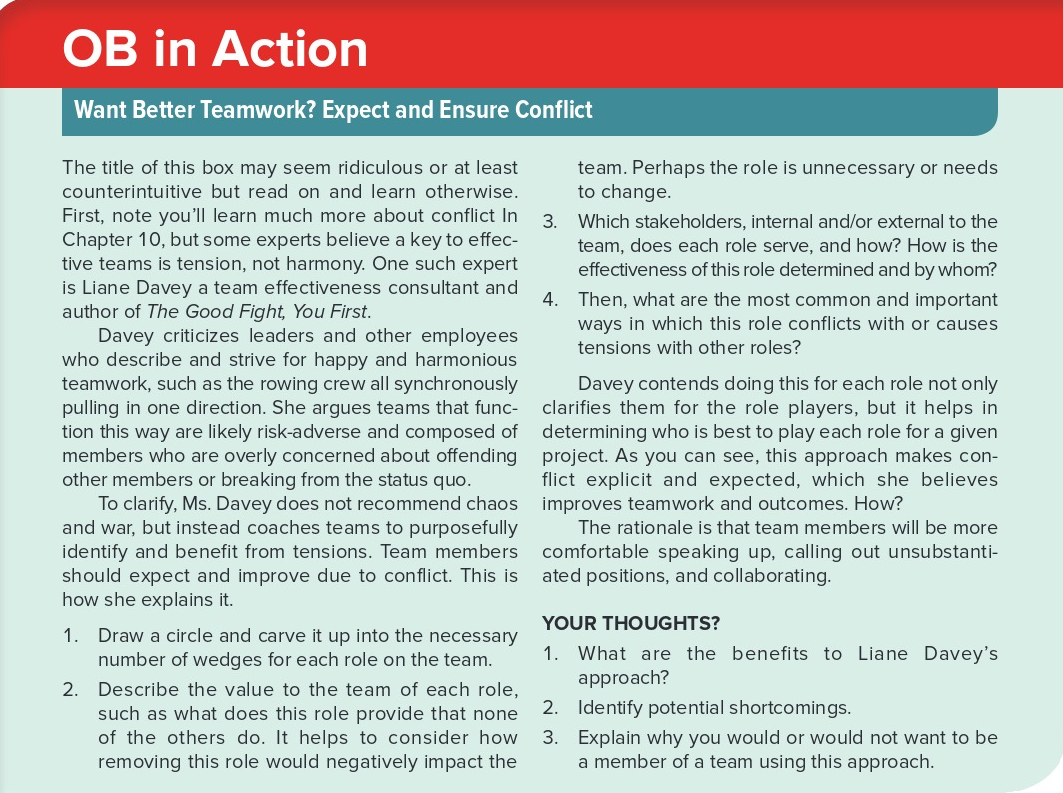Answered step by step
Verified Expert Solution
Question
1 Approved Answer
The title of this box may seem ridiculous or at least counterintuitive but read on and learn otherwise. First, note you'll learn much more about
 The title of this box may seem ridiculous or at least counterintuitive but read on and learn otherwise. First, note you'll learn much more about conflict In Chapter 10, but some experts believe a key to effective teams is tension, not harmony. One such expert is Liane Davey a team effectiveness consultant and author of The Good Fight, You First. Davey criticizes leaders and other employees who describe and strive for happy and harmonious teamwork, such as the rowing crew all synchronously pulling in one direction. She argues teams that function this way are likely risk-adverse and composed of members who are overly concerned about offending other members or breaking from the status quo. To clarify, Ms. Davey does not recommend chaos and war, but instead coaches teams to purposefully identify and benefit from tensions. Team members should expect and improve due to conflict. This is how she explains it. 1. Draw a circle and carve it up into the necessary number of wedges for each role on the team. 2. Describe the value to the team of each role, such as what does this role provide that none of the others do. It helps to consider how removing this role would negatively impact the team. Perhaps the role is unnecessary or needs to change. 3. Which stakeholders, internal and/or external to the team, does each role serve, and how? How is the effectiveness of this role determined and by whom? 4. Then, what are the most common and important ways in which this role conflicts with or causes tensions with other roles? Davey contends doing this for each role not only clarifies them for the role players, but it helps in determining who is best to play each role for a given project. As you can see, this approach makes conflict explicit and expected, which she believes improves teamwork and outcomes. How? The rationale is that team members will be more comfortable speaking up, calling out unsubstantiated positions, and collaborating. YOUR THOUGHTS? 1. What are the benefits to Liane Davey's approach? 2. Identify potential shortcomings. 3. Explain why you would or would not want to be a member of a team using this approach
The title of this box may seem ridiculous or at least counterintuitive but read on and learn otherwise. First, note you'll learn much more about conflict In Chapter 10, but some experts believe a key to effective teams is tension, not harmony. One such expert is Liane Davey a team effectiveness consultant and author of The Good Fight, You First. Davey criticizes leaders and other employees who describe and strive for happy and harmonious teamwork, such as the rowing crew all synchronously pulling in one direction. She argues teams that function this way are likely risk-adverse and composed of members who are overly concerned about offending other members or breaking from the status quo. To clarify, Ms. Davey does not recommend chaos and war, but instead coaches teams to purposefully identify and benefit from tensions. Team members should expect and improve due to conflict. This is how she explains it. 1. Draw a circle and carve it up into the necessary number of wedges for each role on the team. 2. Describe the value to the team of each role, such as what does this role provide that none of the others do. It helps to consider how removing this role would negatively impact the team. Perhaps the role is unnecessary or needs to change. 3. Which stakeholders, internal and/or external to the team, does each role serve, and how? How is the effectiveness of this role determined and by whom? 4. Then, what are the most common and important ways in which this role conflicts with or causes tensions with other roles? Davey contends doing this for each role not only clarifies them for the role players, but it helps in determining who is best to play each role for a given project. As you can see, this approach makes conflict explicit and expected, which she believes improves teamwork and outcomes. How? The rationale is that team members will be more comfortable speaking up, calling out unsubstantiated positions, and collaborating. YOUR THOUGHTS? 1. What are the benefits to Liane Davey's approach? 2. Identify potential shortcomings. 3. Explain why you would or would not want to be a member of a team using this approach Step by Step Solution
There are 3 Steps involved in it
Step: 1

Get Instant Access to Expert-Tailored Solutions
See step-by-step solutions with expert insights and AI powered tools for academic success
Step: 2

Step: 3

Ace Your Homework with AI
Get the answers you need in no time with our AI-driven, step-by-step assistance
Get Started


